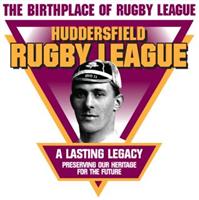Pat Devery - Fartown Legend
Sincere thanks to David Gronow for permission to publish the following article and photographs.
Sincere thanks to David Gronow for permission to publish the following article and photographs.
Patrick Charles Devery was born in Tweed Heads on the North coast of New South Wales in 1923, and first started playing serious rugby league football at Murwillumbah High School and Armidale Teachers’ College.
In 1944, Devery asked the Balmain club for a trial, he was unable to play many matches owing to his naval duties over the next couple of years, but one he did play in was Balmain’s Grand Final winning side against Newtown on 16 September 1944 at the Sydney Cricket Ground.
In 1945 he was absent most of the time and played only three games, but for the visit of Gus Risman’s ‘Indomitables’ he was given the opportunity of regular match-play to unfold his brilliance, of which he took full advantage.
It was at stand-off that Devery gained his Test and Inter-State honours during the 1946 season, playing for City v Country, NSW v Queensland and Great Britain and playing in his first Test match for Australia against Great Britain on 17 June at Sydney, also the Second and Third Test matches at Brisbane and Sydney respectively.
In 38 matches for Balmain he landed 59 goals, and scored 25 tries for a total of 193 points.
At the end of the Australian 1947 season when his Balmain contract had expired he accepted an offer of a three-year contract to play for Huddersfield.
In February 1947, Lionel Cooper and Johnny Hunter arrived at Fartown and soon established themselves in the team, winning the hearts of the supporters, Devery arriving the following June.
Devery had good company on the journey, with him were Harry Bath and Len Kenny who were bound for Barrow and Leeds respectively.
Devery made his debut for Huddersfield against Workington Town at Derwent Park on 4 October 1947, he was shortly appointed captain and held the position until the end of the 1949/50 season.
Originally starting at Fartown as a stand-off half, he played most of his 223 games for Huddersfield at centre.
Playing in his first League Championship Final against Warrington at Maine Road, Manchester on 14 May 1949, he scored a try and kicked two goals in a 13pts-12 win, the following year at the same venue, he was at centre as Huddersfield were defeated 2pts-20 by Wigan on 13 May 1950.
He also captained Other Nationalities - going on to make a total of 11 appearances in all, scoring 5 tries and kicking 16 goals.
He played in two Yorkshire Cup Finals - the first (with a runners-up medal), as Huddersfield lost 4pts-11 against Bradford at Leeds on 29 October 1949, the other, gaining a winners medal against Batley at Headingley, on 15 November 1952, as Huddersfield ran out 18pts-8 winners, Devery kicking three goals.
Devery also went on to win a Challenge Cup winners medal at Wembley on 25 April 1953, as Huddersfield beat St Helens, Devery landing a goal as the Fartowners triumphed by 15pts-10.
His last appearance for Huddersfield was at Batley on 27 March 1954, before announcing his retirement from football on 17 April 1954 - he had scored 98 tries and kicked 401 goals for a points total of 1096.
To this day he still holds the Huddersfield club record for most points in a season with 332, comprising 16 tries and 142 goals in season 1952/53.
Devery, now 88 years of age, lives in Portland, Oregon, USA.
 Pat Devery-Aus 1946Pat Devery - played three times for Australia against England in 1946 |

Huddersfield 1948-49Huddersfield RLFC 1948-49: Winners of the League Championship and Yorkshire League |

Pat Devery - 1953Huddersfield captain Russ Pepperell introduces Pat Devery to the Duke of Norfolk before the 1953 Challenge Cup Final against St Helens at Wembley |




